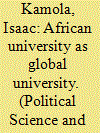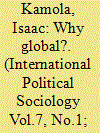|
|
|
Sort Order |
|
|
|
Items / Page
|
|
|
|
|
|
|
| Srl | Item |
| 1 |
ID:
132057


|
|
|
| 2 |
ID:
167362


|
|
|
| 3 |
ID:
176209


|
|
|
|
|
| Summary/Abstract |
Why does IR scholarship seem so resistant to travel into other disciplinary spaces? To answer this question, I look at the tendency for scholars within our discipline to talk to the discipline, about the discipline, and for the discipline. We obsess over ‘IR’ and, in doing so, reify IR as a thing. I turn towards Edward Said’s arguments about the worldliness of texts, and how reification shapes how ideas travel. I then provide two illustrations of how scholars have reified IR as a thing: Robert Cox’s approach to critical theory and Amitav Acharya’s call for a ‘Global IR’. In both cases, contrary to expectation, the authors reify IR as a thing, portraying the discipline as distinct from the world. IR is treated as something with agency, ignoring how disciplinary knowledge is produced within worldly institutions. I conclude by looking at three strategies for studying worldly relations in ways that refuse to reify the discipline: showing disloyalty to the discipline, engaging the political economy of higher education, and seeking to decolonise the university. Rather than reifying IR, these strategies help us to engage our scholarly work in a way that prioritises worldly critical engagements within our disciplinary community, and the world.
|
|
|
|
|
|
|
|
|
|
|
|
|
|
|
|
| 4 |
ID:
161627


|
|
|
|
|
| Summary/Abstract |
Pirates are often described as existing on the margins of the world economy, emerging from the outskirts to disrupt otherwise free capitalist markets. With this narrative in mind, it is not surprising that the pirate remains a marginal figure within both the fictional stories and historical accounts of the emergence of capitalism. This article, however, asks: What do we learn about the capitalist world economy if we understand the pirate not as an outlaw but as a fellow capitalist? Weaving together stories of the golden age of piracy in the Atlantic world with contemporary piracy in the Gulf of Aden, I argue that pirate capitalism helps us to understand the capitalist world economy, not only demonstrating the violence and dispossession at the centre of capitalist accumulation but also making visible the fluid relationship between capital, sovereignty, violence, and freedom.
|
|
|
|
|
|
|
|
|
|
|
|
|
|
|
|
| 5 |
ID:
124409


|
|
|
|
|
| Publication |
2013.
|
| Summary/Abstract |
This article examines the assumed factuality of globalization in light of its persistent conceptual incoherence. Through a diagnosis of five reoccurring ambiguities within the globalization literature, I argue that the concept of globalization lacks an empirical referent. Scholars writing on globalization overcome this absence by asserting that some things (the Internet, McDonald's, etc.) and not others (genocide in Rwanda, refugee camps, etc.) are essentially "global." It turns out, however, that who is positioned to posit some things (and not others) as "global," and therefore posit the foundation for a theory of globalization, is shaped by a highly asymmetrical political economy of knowledge production. In particular, some scholars-usually in North American and European universities-are materially better positioned to produce knowledge about globalization than many of their colleagues in postcolonial countries. The seemingly arbitrary positing of some things as "global," therefore, should be understood as a symptom of the highly unequal social relations in which knowledge about globalization is produced.
|
|
|
|
|
|
|
|
|
|
|
|
|
|
|
|
|
|
|
|
|